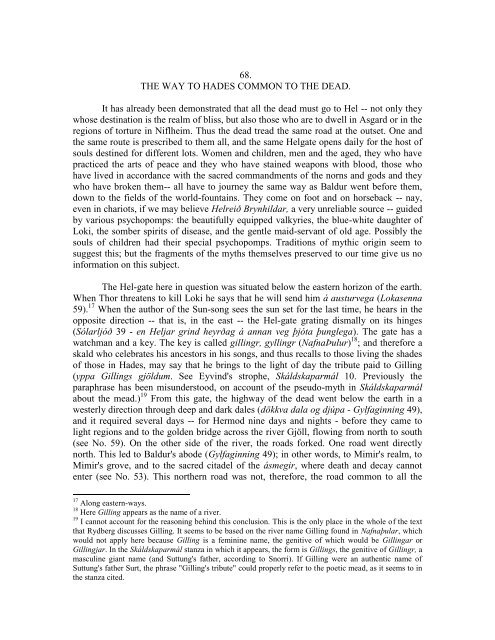Chapters 44-95 - Germanic Mythology
Chapters 44-95 - Germanic Mythology
Chapters 44-95 - Germanic Mythology
You also want an ePaper? Increase the reach of your titles
YUMPU automatically turns print PDFs into web optimized ePapers that Google loves.
68.<br />
THE WAY TO HADES COMMON TO THE DEAD.<br />
It has already been demonstrated that all the dead must go to Hel -- not only they<br />
whose destination is the realm of bliss, but also those who are to dwell in Asgard or in the<br />
regions of torture in Niflheim. Thus the dead tread the same road at the outset. One and<br />
the same route is prescribed to them all, and the same Helgate opens daily for the host of<br />
souls destined for different lots. Women and children, men and the aged, they who have<br />
practiced the arts of peace and they who have stained weapons with blood, those who<br />
have lived in accordance with the sacred commandments of the norns and gods and they<br />
who have broken them-- all have to journey the same way as Baldur went before them,<br />
down to the fields of the world-fountains. They come on foot and on horseback -- nay,<br />
even in chariots, if we may believe Helreið Brynhildar, a very unreliable source -- guided<br />
by various psychopomps: the beautifully equipped valkyries, the blue-white daughter of<br />
Loki, the somber spirits of disease, and the gentle maid-servant of old age. Possibly the<br />
souls of children had their special psychopomps. Traditions of mythic origin seem to<br />
suggest this; but the fragments of the myths themselves preserved to our time give us no<br />
information on this subject.<br />
The Hel-gate here in question was situated below the eastern horizon of the earth.<br />
When Thor threatens to kill Loki he says that he will send him á austurvega (Lokasenna<br />
59). 17 When the author of the Sun-song sees the sun set for the last time, he hears in the<br />
opposite direction -- that is, in the east -- the Hel-gate grating dismally on its hinges<br />
(Sólarljóð 39 - en Heljar grind heyrðag á annan veg þjóta þunglega). The gate has a<br />
watchman and a key. The key is called gillingr, gyllingr (NafnaÞulur) 18 ; and therefore a<br />
skald who celebrates his ancestors in his songs, and thus recalls to those living the shades<br />
of those in Hades, may say that he brings to the light of day the tribute paid to Gilling<br />
(yppa Gillings gjöldum. See Eyvind's strophe, Skáldskaparmál 10. Previously the<br />
paraphrase has been misunderstood, on account of the pseudo-myth in Skáldskaparmál<br />
about the mead.) 19 From this gate, the highway of the dead went below the earth in a<br />
westerly direction through deep and dark dales (dökkva dala og djúpa - Gylfaginning 49),<br />
and it required several days -- for Hermod nine days and nights - before they came to<br />
light regions and to the golden bridge across the river Gjöll, flowing from north to south<br />
(see No. 59). On the other side of the river, the roads forked. One road went directly<br />
north. This led to Baldur's abode (Gylfaginning 49); in other words, to Mimir's realm, to<br />
Mimir's grove, and to the sacred citadel of the ásmegir, where death and decay cannot<br />
enter (see No. 53). This northern road was not, therefore, the road common to all the<br />
17 Along eastern-ways.<br />
18 Here Gilling appears as the name of a river.<br />
19 I cannot account for the reasoning behind this conclusion. This is the only place in the whole of the text<br />
that Rydberg discusses Gilling. It seems to be based on the river name Gilling found in Nafnaþular, which<br />
would not apply here because Gilling is a feminine name, the genitive of which would be Gillingar or<br />
Gillingjar. In the Skáldskaparmál stanza in which it appears, the form is Gillings, the genitive of Gillingr, a<br />
masculine giant name (and Suttung's father, according to Snorri). If Gilling were an authentic name of<br />
Suttung's father Surt, the phrase "Gilling's tribute" could properly refer to the poetic mead, as it seems to in<br />
the stanza cited.
















